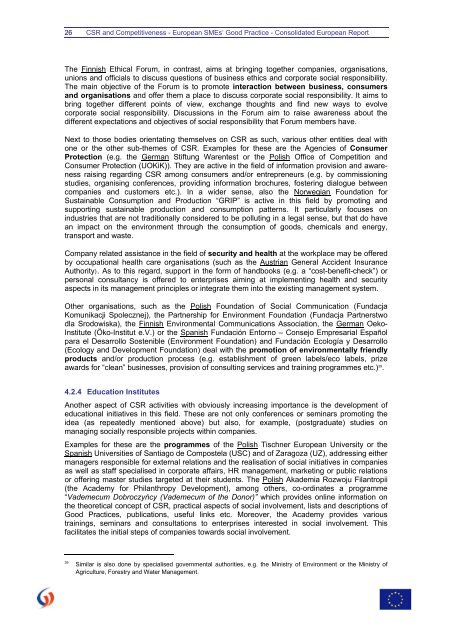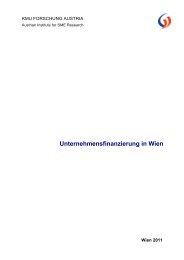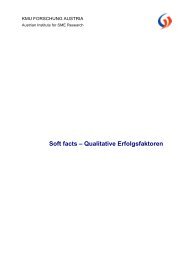CSR and Competitiveness European SMEs - KMU Forschung Austria
CSR and Competitiveness European SMEs - KMU Forschung Austria
CSR and Competitiveness European SMEs - KMU Forschung Austria
Create successful ePaper yourself
Turn your PDF publications into a flip-book with our unique Google optimized e-Paper software.
26 <strong>CSR</strong> <strong>and</strong> <strong>Competitiveness</strong> - <strong>European</strong> <strong>SMEs</strong>’ Good Practice - Consolidated <strong>European</strong> Report<br />
The Finnish Ethical Forum, in contrast, aims at bringing together companies, organisations,<br />
unions <strong>and</strong> officials to discuss questions of business ethics <strong>and</strong> corporate social responsibility.<br />
The main objective of the Forum is to promote interaction between business, consumers<br />
<strong>and</strong> organisations <strong>and</strong> offer them a place to discuss corporate social responsibility. It aims to<br />
bring together different points of view, exchange thoughts <strong>and</strong> find new ways to evolve<br />
corporate social responsibility. Discussions in the Forum aim to raise awareness about the<br />
different expectations <strong>and</strong> objectives of social responsibility that Forum members have.<br />
Next to those bodies orientating themselves on <strong>CSR</strong> as such, various other entities deal with<br />
one or the other sub-themes of <strong>CSR</strong>. Examples for these are the Agencies of Consumer<br />
Protection (e.g. the German Stiftung Warentest or the Polish Office of Competition <strong>and</strong><br />
Consumer Protection (UOKiK)). They are active in the field of information provision <strong>and</strong> awareness<br />
raising regarding <strong>CSR</strong> among consumers <strong>and</strong>/or entrepreneurs (e.g. by commissioning<br />
studies, organising conferences, providing information brochures, fostering dialogue between<br />
companies <strong>and</strong> customers etc.). In a wider sense, also the Norwegian Foundation for<br />
Sustainable Consumption <strong>and</strong> Production “GRIP” is active in this field by promoting <strong>and</strong><br />
supporting sustainable production <strong>and</strong> consumption patterns. It particularly focuses on<br />
industries that are not traditionally considered to be polluting in a legal sense, but that do have<br />
an impact on the environment through the consumption of goods, chemicals <strong>and</strong> energy,<br />
transport <strong>and</strong> waste.<br />
Company related assistance in the field of security <strong>and</strong> health at the workplace may be offered<br />
by occupational health care organisations (such as the <strong>Austria</strong>n General Accident Insurance<br />
Authority). As to this regard, support in the form of h<strong>and</strong>books (e.g. a “cost-benefit-check”) or<br />
personal consultancy is offered to enterprises aiming at implementing health <strong>and</strong> security<br />
aspects in its management principles or integrate them into the existing management system.<br />
Other organisations, such as the Polish Foundation of Social Communication (Fundacja<br />
Komunikacji Spolecznej), the Partnership for Environment Foundation (Fundacja Partnerstwo<br />
dla Srodowiska), the Finnish Environmental Communications Association, the German Oeko-<br />
Institute (Öko-Institut e.V.) or the Spanish Fundación Entorno – Consejo Empresarial Español<br />
para el Desarrollo Sostenible (Environment Foundation) <strong>and</strong> Fundación Ecología y Desarrollo<br />
(Ecology <strong>and</strong> Development Foundation) deal with the promotion of environmentally friendly<br />
products <strong>and</strong>/or production process (e.g. establishment of green labels/eco labels, prize<br />
awards for “clean” businesses, provision of consulting services <strong>and</strong> training programmes etc.) 39 .<br />
4.2.4 Education Institutes<br />
Another aspect of <strong>CSR</strong> activities with obviously increasing importance is the development of<br />
educational initiatives in this field. These are not only conferences or seminars promoting the<br />
idea (as repeatedly mentioned above) but also, for example, (postgraduate) studies on<br />
managing socially responsible projects within companies.<br />
Examples for these are the programmes of the Polish Tischner <strong>European</strong> University or the<br />
Spanish Universities of Santiago de Compostela (USC) <strong>and</strong> of Zaragoza (UZ), addressing either<br />
managers responsible for external relations <strong>and</strong> the realisation of social initiatives in companies<br />
as well as staff specialised in corporate affairs, HR management, marketing or public relations<br />
or offering master studies targeted at their students. The Polish Akademia Rozwoju Filantropii<br />
(the Academy for Philanthropy Development), among others, co-ordinates a programme<br />
“Vademecum Dobroczyńcy (Vademecum of the Donor)” which provides online information on<br />
the theoretical concept of <strong>CSR</strong>, practical aspects of social involvement, lists <strong>and</strong> descriptions of<br />
Good Practices, publications, useful links etc. Moreover, the Academy provides various<br />
trainings, seminars <strong>and</strong> consultations to enterprises interested in social involvement. This<br />
facilitates the initial steps of companies towards social involvement.<br />
39<br />
Similar is also done by specialised governmental authorities, e.g. the Ministry of Environment or the Ministry of<br />
Agriculture, Forestry <strong>and</strong> Water Management.




